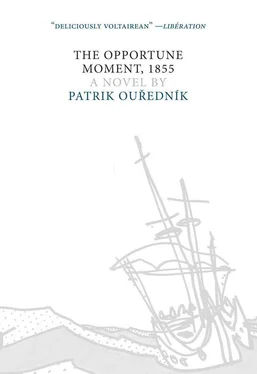The Madeira mountains appeared on the starboard side today. All day long there were birds flying around us. The weather is calm and getting warmer all the time.
We crossed paths with a ship. Everyone was shouting and waving their hats and scarves.
Even among us Italians there are disputes over how things should look in the settlement, and gradually three groups have emerged. One led by Zeffirino, one by Decio, and one by no one really — maybe Giacomo. Zeffirino is the richest one of us, or was, anyway, since soon everything will be shared. He pals around with Gorand a lot, since he was in Africa also, and when he returned home after six years, he enrolled in the school of agronomics and worked at the economic commune in Lazio for three years. He was the one who first spread Older Brother’s ideas in our country and began talking people into moving away to Brazil. But he doesn’t agree with all of Older Brother’s ideas. He says it’s a mistake for the settlement to be open to anyone, since there are hangers-on and ne’er-do-wells in every group of people, and if our settlement is to be the forerunner of a new world, it should only admit truly capable and motivated individuals. Decio says people aren’t born as hangers-on and ne’er-do-wells but become that way through the utter debasement of human labor, and that’s the fault of religion and the capitalist system. Giacomo says religion isn’t in and of itself counter to freedom, it’s possible to believe in a Higher Being and at the same time be a free and full-fledged member of human society. Domenico said a new religion had sprung up in America called the Church of Latter-Day Saints, and that they were establishing settlements and the women were shared, or almost. And that in America they’d found a holy book even older than the Gospels were. Decio replied that everything in America’s always the oldest or the newest or the biggest or the greenest, which is typical for fanatics who think they’ve swallowed Solomon’s dung. And as long as people believe in religious claptrap, they’ll never be free.
We entered the Canary Islands. Most of the ships heading for America stop here to replenish their supplies. The captain said that that would needlessly detain us and it was better to wait for the islands of Cape Verde, and besides, the prices were cheaper there. We crossed paths with two ships.
Mrs. Crisson, who is often ill, was given an unoccupied cabin in first class. Giacomo and most of the Italians and the French say that it’s normal and correct. But others say it’s a manifestation of individualism and it isn’t normal and correct for these sorts of matters to be decided by the husband alone (Mr. Crisson asked the captain about it). Umberto said it was a typical aristocratic move. Elisabetta said that if Mrs. Crisson was sick all the time, she shouldn’t have come on the trip in the first place.
We decided with a majority of 30 votes that participation in meetings would be mandatory for everyone, since matters were discussed there that affected all of us. Zeffirino said it wasn’t good to let the French discuss everything on their own. We sent a delegation to the Germans and the Austrians, who agreed with our decision, even though almost none of them understand French. Tranquillo Agottani said he would translate into German whatever Decio or Zeffirino or Paolo interpreted into Italian for him. Elisabetta said: Why couldn’t Bruno interpret into Italian? Everyone looked at me. We also decided, with a majority of twenty-eight votes, to hold meetings regularly every other evening with the agenda available for participants to look at by 4:00 p.m. at the latest. If there’s nothing important to discuss, the agenda will consist of “Singing and Improvised Entertainment.” Meetings will be held on deck. Zeffirino asked the captain for a waxed sail for meeting-goers to hide under in case of rain.
Today we had our first meeting. Most of the discussion was about food supplies. The oranges, which are beginning to rot, will be distributed to all the settlers equally, even the Germans, who haven’t paid their fees. The sugar will be weighed out and distributed to each as he is owed, but only to those who have turned in their fees. This applies to us Italians, the French, the Austrians, and about a third of the Germans. The motion was submitted by Manfredi, who had noticed some settlers taking advantage of the shared sugar to pour themselves three times more than anyone else.
The drinking water is also beginning to spoil. It was agreed to raise the ration of wine per person from 2 dcl to 2.5 dcl. Zeffirino moved that the increase apply only to persons over the age of thirteen, but a group of about twenty Frenchmen, who call themselves Egalitarians, opposed it, so that children will receive the same share as everyone else. Mr. Mangin then moved that volunteers from the ranks of the French hold classes in French for the others, with classes to be held every day before noon on the rear deck. Eight Frenchmen and one Frenchwoman raised their hands to volunteer. We crossed paths with another ship.
This morning the mountainous cliffs of the first island of Cape Verde rose up before us. There are ten of them altogether. The captain is heading for the southernmost one, São Tiago. Giacomo read us the encyclopedia entry: a Genoan discovered the island in the fifteenth century. The port we’re heading for is called Tarrafal. We should arrive tomorrow afternoon or evening. Cape Verde belongs to Portugal and trades mainly in salt, sand, and slaves. The shipmaster said we might see some whales. There were no meetings or classes held, as people were eager and agitated.
We spent the whole day sailing through the islands. We proposed to the captain that we dump the old drinking water and replace it with a fresh supply, but the captain said that water was very expensive in Cape Verde and if we wanted to replace it, it would cost us more than a week’s worth of food. Vito Ferroni declared that he didn’t see why we hadn’t filled up on fresh water when we were in the Canary Islands, where it was free.
Toward evening we dropped anchor at the mouth of a large gulf. People were looking forward to spending a few hours on dry land tomorrow, but the first officer said we’d paid for passage to Brazil, not a tourist excursion to Cape Verde. Decio, Giacomo, and Haymard went to the captain, but he confirmed the officer’s words, saying these waters were Portuguese territory and we didn’t have permission to leave the ship. But tomorrow morning, he said, local traders would come aboard and we could buy fresh fruit, meat, and bread from them.
This morning everyone rushed on deck to wait for the arrival of the Portuguese traders’ boats. There was a village at the south end of the gulf with Negro women and children standing in the surf collecting sand from the water and making it into large piles, which the men then carried away on carts drawn by donkeys and animals that looked like buffalo. Other women stood on shore breaking rocks with hammers. I took out my telescope and inspected the inhabitants. The women were stout, almost naked, tattooed, and not very pretty. Thanks to my telescope, I was the first to see the boats rowing toward us from the harbor.
Cape Verdeans don’t look Portuguese, they have different traits than Europeans do, and most of them are mestizo. They were selling practically everything, fruit, meat, pigs and fowl, all sorts of tools, even wooden dolls and rattles. I bought six coconuts, two dozen oranges, and a big conch shell for Elisabetta.
Читать дальше












